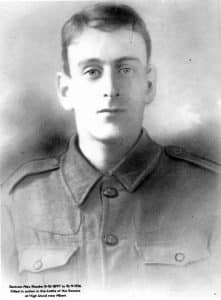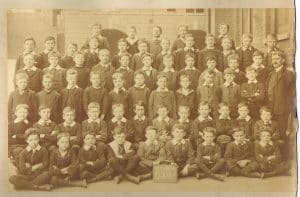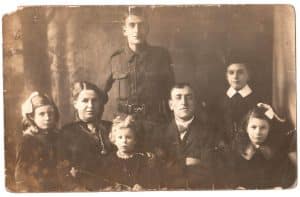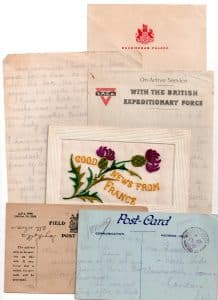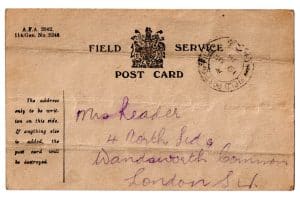Over 1700 Old Emanuels served in both World Wars, with almost 250 losing their lives. This Remembrance Day article remembers Bertram Alec Reader (OE1909-13) who joined the army underage and lost his life in 1916, in the opening stages of his first major battle.
Eighteen-year-old Private Alec Reader was killed in the trenches of the First World War in an action called ‘High Wood’ in Foureaux Forest which tried to force back a German advance. He was one of 8000 killed on September 15th, 1916, a day with particularly horrific casualties which began be going ‘over the top’ at 6.20am. High Wood was near the French town of Albert and when the 47th Division went ‘over the top’ Alec was killed instantly by a sniper’s bullet only a few steps from his own trench line in a battle which was described as “Hell on Earth”.
In one of the numerous letters Alec wrote to his mother he describes his life in the trenches:
“I have undergone the various emotions caused by war, have seen most things that happen at war and don’t think much of it. I have seen mines go up, have been knocked down by the explosion of an aerial torpedo (they kill by concussion at 40 yards), have seen men killed and wounded and have had to carry a mortally wounded man to a dressing station on a stretcher. The poor chap was dying fast, and knew it, it was awful. A mine went up under the Battalion on the right and caused over one hundred casualties. War is a rotten game.”
Alec left Emanuel School aged fifteen and was described in the school magazine as “a promising long-distance runner” and firstly worked at the post office before joining the army when he was seventeen, lying about his age. Like many he was a boy who could not wait to get to war and after months of basic training in the UK finally arrived in France in early 1916. At the time of his death, Alec had in total Alec had been in the army for thirteen months and had seen little action except in training. His story is saddened even further by the fact that he could have left the army earlier, as due to a change in army bureaucracy those who joined underage were allowed to leave should they so wish. At the time of his death, he was waiting for a particular form which would have led to his discharge, but the bureaucracy was complex and slow-moving. Alec’s letters also reveal that he deliberately postponed leaving because he did not want to let soldiers, those who had become his friends, down.
In those thirteen months Alec wrote seventy-seven letters, mainly to his mother. Many are very poignant and discuss routine matters, such as how he keeps his feet dry, the friends he makes, jokes he heard, illnesses to friends and how he survives in the trenches. He also showed a great sense of humour and quipped that in the war he “dug up half of France” and that when German bombs were heading his way “The sensible ones get down into the bottom of the trench when things get a bit hot, and they are the men who ‘live to fight another day’”.
This is what he wrote six days before his death in letter number 75, dated 09.09.1916 (however, the last thing Alec ever sent home was a Field Postcard just to signal that he was alive on 14th September). His final letter noted:
“I am sorry to have to disappoint you, but the transfer has had another check. You see, after I had filled the form they found out that it wasn’t the correct one […] If you don’t hear from me for a day or two you must understand that the postal facilities will be very poor and it is quite possible that our letters won’t be collected for a week […] We are billeted In a farm and the lady of the house is skinning a rabbit for her Sunday’s dinner. In a minute she will clean out the cow shed next door to us so I must pack up, as when she does start the air turns very blue and we have wear our gas helmets. “
Remembrance Day allows us to reflect upon all those who lost their lives and although many of those who perished will remain sadly anonymous to us this is not the case with Alec Reader. Due to the remarkable dedication of his family, this poignant story has lived long beyond his death and has featured in several books and newspaper articles, including Neil Hanson’s ‘The Unknown Soldier.’ In 2018 when we were remembering the 100th anniversary of the end of the First World War, one hundred images of fallen soldiers flashed up on the big screen at Trafalgar Square, one of which was Alec, and this was a proud and moving moment for his family.
After his death Alec’s mother received a letter saying that his body had been found at the edge of a wood and buried but was later lost after the battlelines shifted. For years, she tried in vain to find the grave, and was told in 1923 that soldiers who had been buried in isolated spots had been moved to other war cemeteries. Although the story of the ‘lost’ grave attracted fresh media attention it was never found. His name was eventually added to the Thiepval Memorial, which is within two miles of where he died.
Over the following decades two of Alec’s nephews, Doug, and Roger Goodman, uncovered every stone in piecing together Alec’s short life and even met soldiers he served with. On the 15th of September 2006 some of his family once again visited High Wood, and exactly 90 years after his death stood in the remains of a shallow trench close to where he was killed.
For years Alec’s family tried to find out the exact circumstances of his death, but the battles connected to the Somme had such astonishingly high casualty rates they had all but given up hope of find out exactly what happened at High Wood on September 15th, 1916. However, in 2013 the family of a soldier (Vern Wilkinson) who had come across the Alec Reader story got in touch and Vern’s surviving diary provided detailed information about what exactly happened to Alec, giving a sense of closure to the family:
“We clambered over the top of the parapet and were immediately met with a murderous machine gun fire, some of my pals falling at once. The din was terrific, the bark of our 18 pounders was heard above everything else and the shells themselves seemed to just skim over our heads almost scorching us. The rattle of dozens of Jerry machine guns made it seem impossible for us to live a second under the hail of bullets that showered by us, yet we pushed on. [..]
Young Reader fell at the side of me with a groan and blood rushed from a wound in the head. I just turned to glance at him and could see that death was instantaneous and so passed that cheerful spirited lad to whom everything was ‘very cosy’. “
Although First and Second World War Remembrance Days may seem distant to many children the death of Alec Reader was certainly never forgotten by his family. The Emanuel School community remembers the near 250 Old Emanuels who died in both conflicts, many who were the same age as our six form pupils.
Copies of many of Alec’s 77 letters are available for browsing in the School Archive and his story is explored in much more detail in our 2014 book ‘Emanuel School at War’.
Mr Jones (Senior Librarian and Emanuel School Archivist)
